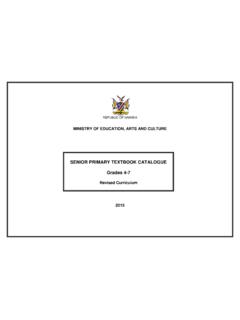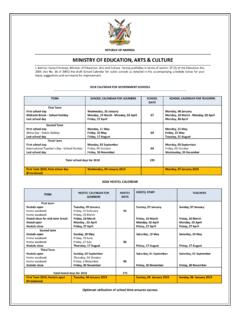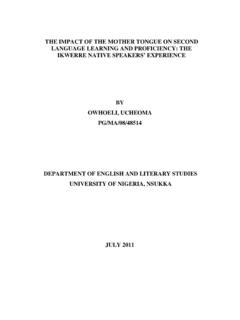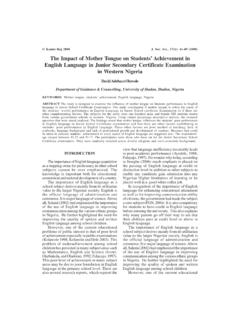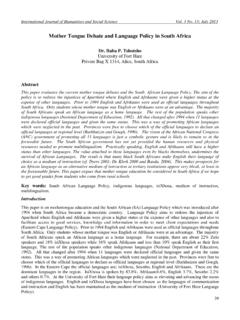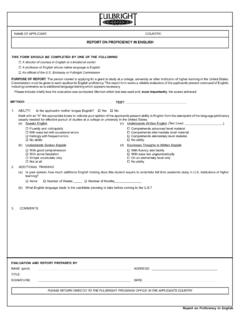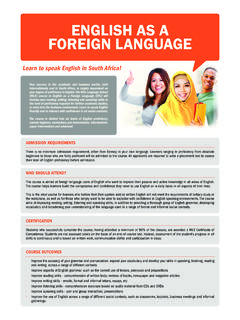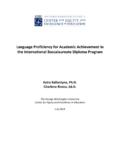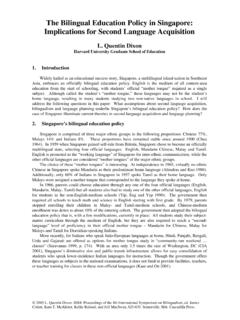Transcription of The Language Policy for Schools in Namibia
1 The Language Policyfor Schoolsin NamibiaDiscussion DocumentJanuary 2003 EnglishTHE Language POLICYFOR SCHOOLSIN NAMIBIAD iscussion DocumentJanuary 2003 Ministry of Basic Education, Sport and Culture(MBESC)Recommendation to the Discussion Document The discussion document should be widely discussed before approval. The discussion document and the final Language Policy for Schools inNamibia should be made available in all local languages and distributedto regional education offices, Schools , teacher resource centres, parents,communities and all other stakeholders in education. MBESC, 2003 Cover design by Bryony SimmondsFirst published 2003 Produced by the Upgrading African Languages Project (AfriLa), Namibia ,supported by gtz and implemented by Box 8016 WINDHOEKN amibia1. After Independence in March 1990, the then Ministry of Education, Youth,Culture and Sport began reviewing the Language Policy for Schools .
2 Inorder to develop a national Policy , discussions were held in all regions ofthe country and a draft Policy was developed. After lengthy discussions theagreed Policy was issued in the document Education and Culture in Na-mibia: The Way Forward to 1996 in The following criteria were taken into consideration when the Policy wasbeing developed and are still valid today: The expectation that a Language Policy should facilitate the realisationof the substantive goals of education. The equality of all national languages regardless of the number of speak-ers or the level of development of a particular Language . The cost of implementing the Policy . The fact that Language is a means of transmitting culture and culturalidentity. The fact that for pedagogical reasons it is ideal for learners to studythrough their mother tongue , particularly in the early years of schoolingwhen basic skills of reading, writing and concept formation are acquired.
3 The need for learners to be proficient enough in english , the officiallanguage, at the end of the seven-year primary school cycle in order togain access to further education as well as to a Language of wider The major innovation in the Policy was to ensure that english became themedium of instruction from Grade 4 upwards. Although the Policy statedthat learners should be taught through the medium of their mother tonguein the early years of schooling and that all languages should be treatedequally, the implementation of the Policy was not evenly applied over thewhole country. Many learners did not have the opportunity to learn throughtheir mother tongues, and many Schools did not offer Namibian indigenouslanguages as subjects for study up to Grade 12 Education in the mother tongue , especially in the lower primary cycle ofbasic education, is crucial for concept formation as well as literacy andnumeracy attainment.
4 In order to be literate, one should not only speakwell, but also know the written Language , as Language is the system ofhuman expression by means of words. For people to be in a position tocommunicate and understand each other this system needs to be fully func-1tional. A Language is able to survive only if its mother tongue speakerscommunicate in their mother In order to cope with its survival in today s world, a Language should there-fore retain the cultural values embedded in it and the traditional ways ofexpression. A person s identity is contained in the Language and the cultureyou have inherited from your forefathers. To be an individual in amulticultural society you must possess your cultural identity and tradi-tional norms that you call your own. Nevertheless, a Language can onlydevelop to its fullest potential if it is exposed to the influences of an ever-changing society and adapts these influences into its corpus.
5 The indig-enous languages should be strengthened by linguistic development through,amongst others, standardisation, harmonisation and the coining of newwords. Concurrently, the promotion of mother tongue use should not onlybe furthered evenly through a Language in education Policy , that is imple-mented nationwide, but also through a higher status of mother tongue /indigenous languages within every sector of Shortly after independence in 1990, Namibia perceived the need to have anew Language Policy for Schools in order to promote mother tongue use,alongside english , in Schools and colleges of education. A document calledThe Language Policy for Schools : 1992-1996 and Beyond, was formulatedand implemented shortly afterwards. However, it was not explicitly out-lined how national languages (or mother tongues) should be used in were discrepancies in the implementation of the Language policyfrom region to region, as Policy implementers, due to misinterpretation andmanipulation, mainly preferred teaching through english rather than throughthe mother tongue .
6 Formerly disadvantaged learners were furthermarginalised in this process, as non- english speaking teachers were ex-pected to teach through the medium of english . Any teaching approach,including the learner-centred approach to teaching advocated by the Min-istry of Basic Education, Sport and Culture, cannot be easily realised ifteachers and learners lack the necessary Language skills and Proficiency in english does not automatically ensure effective participa-tion in society. One is rather considered an effective participant in societyif you are able to communicate and use all the functional tools in yourmother tongue to your personal advantage and social benefit. The use ofEnglish as a Language of wider communication will only further enhancegreater participation in social welfare activities.
7 It is against this back-ground that the new Policy document, titled Language Policy for Schoolsin Namibia , was revised. The revised document intends to promote the useof mother tongue as a medium of instruction in the formative years ofschooling (Grades 1-3) and its continued use as a school subject in further2education. mother tongue undoubtedly plays a crucial role in the acquisi-tion of any second Language , english in the case of Namibia . Englishwill therefore be used in its official capacity as a medium of instruction andassessment throughout the education system in public Schools as from Grade4 . The goals of the Policy The seven-year primary education cycle should enable learners to ac-quire reasonable competence in english , the official Language , and beprepared for english medium instruction throughout the secondary cy-cle.
8 Education should promote the Language and cultural identity of learnersthrough the use of mother tongue as medium of instruction in Grades 1-3and the teaching of mother tongue throughout formal education. Grade 4is a transitional year in which the mother tongue plays a supportive rolein the teaching. mother tongue should be taught as a subject. Schools must offer not less than two languages as subjects from Grade .Changes to the existing National school Language Policy1996 and Beyond 1 There are few pertinent changes to the existing Policy . These are: The strengthening of mother tongue instruction in Grades 1, 2 and 3through materials development and teacher pre- and in-service training. More emphasis for the mother tongues to be taken as First Languagesubjects from Grade 1 through to Grade 12. Emphasis on the fact that the wish by a school , school board and parentcommunity to offer english as medium of instruction from Grade 1 mustreceive ministerial One of the outcomes of the Language and Development in Southern Africa Conference heldat Okahandja in April 2000 was that the Language Policy be revised.
9 All recommendationsmade during the conference have been followed with the exception of that advocating thatmother tongue should be the Language of instruction beyond Grade 3. The reason why this hasnot been included is due to the financial implications. Such a change would incur additionalfunding for the provision of textbooks and teaching and learning materials, whereas materialshave already been developed, as part of the educational reform in english from Grades 4 to 7,at considerable cost. (For the full recommendations, see Trewby, R. & S. Fitchat (eds.). and Development in Southern Africa: Making the Right Choices, pp. : Gamsberg Macmillan.)35. The Language Grades 1-3 will be taught either through the mother tongue or a predomi-nant local Language . If parents or the school wish to use english as themedium of instruction in the Lower Primary phase, permission must beobtained from the Minister of Basic Education, Sport and Culture withwell-grounded, convincing Grade 4 will be a transitional year when the change to english as medium ofinstruction must take In Grades 5-7 english will be the medium of instruction.
10 In the UpperPrimary phase the mother tongue may only be used in a supportive role andcontinues to be taught as a Grades 8-12 will be taught through the medium of english , and the mothertongue will continue to be taught as a Examinations: Grades 7, 10, and 12 national examinations will be takenthrough the medium of english , except for the mother tongue that is takenas a english is a compulsory subject, starting from Grade 1, and continuingthroughout the school learners must study two languages as subjects from Grade 1 onwards,one of which must be english . Where there are sufficient learners from thesame Language group to form a class, provision must be made for them tostudy their own mother tongue up to Grade The only exception to this two- Language minimum is for expatriate learn-ers who may be permitted to opt for a one- Language Nothing in the Policy will prevent a learner taking english , a foreign lan-guage and a Namibian Language , as long as one of the languages is taken oneither first or second Language Language options available are:First- Language levelAfrikaansEnglishGermanJu| hoansiKhoekhoegowabOshikwanyamaOshindong aOtjihereroRukwangaliRumanyoSetswanaSilo ziThimbukushu(Portuguese)4 Second- Language levelAfrikaansEnglish(Other second languages will be developed according to demand.)
